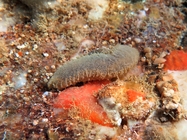WoRMS taxon details
Flabelligera diplochaitus (Otto, 1820)
130105 (urn:lsid:marinespecies.org:taxname:130105)
accepted
Species
Amphitrite viridispurpurea Renier, 1807 · uncertain > nomen dubium (rejected publication, thus an...)
rejected publication, thus an unavailable name
Chloraema dubium Quatrefages, 1866 · unaccepted (subjective synonym)
Flabelligera diplochaitos [auct. misspelling for 'diplochaitus'] · unaccepted (subsequent author misspelling)
Siphonostoma diplochaitus (Otto, 1820) · unaccepted (superseded subsequent combination)
Siphostoma diplochaitus Otto, 1820 · unaccepted (superseded original combination)
marine
(of Siphostoma diplochaitus Otto, 1820) Otto, Adolfus Guilielmus. (1820). De Sternaspide thalassemoideo et Siphostomate diplochaito vermibus duobus marinis. [Epistola Gratulatoria quam ad celebrandum diem laetissimum VI Marti MDCCCXX (etc, etc)]. <em>Vratislaviae.</em> pp.16, 2 plates.
page(s): 12 [details]
page(s): 12 [details]
Type locality contained in Gulf of Naples (Italy)
type locality contained in Gulf of Naples (Italy) [from synonym] [view taxon] [details]
Read, G.; Fauchald, K. (Ed.) (2024). World Polychaeta Database. Flabelligera diplochaitus (Otto, 1820). Accessed through: World Register of Marine Species at: https://www.marinespecies.org/aphia.php?p=taxdetails&id=130105 on 2024-04-26
Date
action
by
![]() The webpage text is licensed under a Creative Commons Attribution 4.0 License
The webpage text is licensed under a Creative Commons Attribution 4.0 License
original description
(of Siphostoma diplochaitus Otto, 1820) Otto, Adolfus Guilielmus. (1820). De Sternaspide thalassemoideo et Siphostomate diplochaito vermibus duobus marinis. [Epistola Gratulatoria quam ad celebrandum diem laetissimum VI Marti MDCCCXX (etc, etc)]. <em>Vratislaviae.</em> pp.16, 2 plates.
page(s): 12 [details]
original description (of Amphitrite viridispurpurea Renier, 1807) Renier, S.A. (1807). Tavole per servire alla classificazione e conoscenza degli animali, [1] + pl. I-VIII. Note: work placed on the Official Index of Rejected and Invalid Works in Zoological Nomenclature by ICZN Opinion 427 (1956). Padova (Tipografia del Seminario)
note: not seen, but fide Meneghetti (1847: 44) that it is in the 1807 work. It is not in the 1804 works of Renier. [details]
original description (of Chloraema dubium Quatrefages, 1866) Quatrefages, A. de. (1866 (1865)). Histoire naturelle des Annelés marins et d'eau douce. Annélides et Géphyriens. <em>Librarie Encyclopédique de Roret. Paris.</em> <b>Volume 1.</b> 1-588., available online at http://books.google.com/books?id=FV9IAAAAYAAJ [details]
basis of record Bellan, G. (2001). Polychaeta, <i>in</i>: Costello, M.J. <i>et al.</i> (Ed.) (2001). European register of marine species: a check-list of the marine species in Europe and a bibliography of guides to their identification. <em>Collection Patrimoines Naturels.</em> 50: 214-231. (look up in IMIS) [details]
additional source Dauvin, J.-C.; Dewarumez, J.-M.; Gentil, F. (2003). Liste actualisée des espèces d'Annélides Polychètes présentes en Manche [An up to date list of polychaetous annelids from the English Channel]. <em>Cahiers de Biologie Marine.</em> 44(1): 67-95., available online at http://www.sb-roscoff.fr/sites/www.sb-roscoff.fr/files/documents/station-biologique-roscoff-dauvinal2003-3835.pdf [details] Available for editors [request]
[request]
page(s): 12 [details]
original description (of Amphitrite viridispurpurea Renier, 1807) Renier, S.A. (1807). Tavole per servire alla classificazione e conoscenza degli animali, [1] + pl. I-VIII. Note: work placed on the Official Index of Rejected and Invalid Works in Zoological Nomenclature by ICZN Opinion 427 (1956). Padova (Tipografia del Seminario)
note: not seen, but fide Meneghetti (1847: 44) that it is in the 1807 work. It is not in the 1804 works of Renier. [details]
original description (of Chloraema dubium Quatrefages, 1866) Quatrefages, A. de. (1866 (1865)). Histoire naturelle des Annelés marins et d'eau douce. Annélides et Géphyriens. <em>Librarie Encyclopédique de Roret. Paris.</em> <b>Volume 1.</b> 1-588., available online at http://books.google.com/books?id=FV9IAAAAYAAJ [details]
basis of record Bellan, G. (2001). Polychaeta, <i>in</i>: Costello, M.J. <i>et al.</i> (Ed.) (2001). European register of marine species: a check-list of the marine species in Europe and a bibliography of guides to their identification. <em>Collection Patrimoines Naturels.</em> 50: 214-231. (look up in IMIS) [details]
additional source Dauvin, J.-C.; Dewarumez, J.-M.; Gentil, F. (2003). Liste actualisée des espèces d'Annélides Polychètes présentes en Manche [An up to date list of polychaetous annelids from the English Channel]. <em>Cahiers de Biologie Marine.</em> 44(1): 67-95., available online at http://www.sb-roscoff.fr/sites/www.sb-roscoff.fr/files/documents/station-biologique-roscoff-dauvinal2003-3835.pdf [details] Available for editors
 Present
Present  Present in aphia/obis/gbif/idigbio
Present in aphia/obis/gbif/idigbio  Inaccurate
Inaccurate  Introduced: alien
Introduced: alien  Containing type locality
Containing type locality
From editor or global species database
Spelling Salazar-Vallejo (2012:18) stated "The original combination had a misconstructed adjective. Thus, it might have to be modified to a correct spelling as F. diplochaeta, but the new name, albeit slightly different, might generate confusion which is not advisable, and consequently the name is being kept in its original spelling as Flabelligera diplochaitus" It is assumed Salazar-Vallejo was indicating an incorrect original Latinisation (the spelling is chaetus, not chaitus) rather than that there was incorrect gender agreement, thus the species-group name is now treated as a noun in apposition and is unchanging for gender in new combinations. [details]
